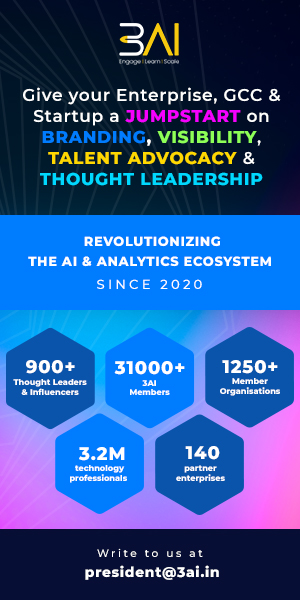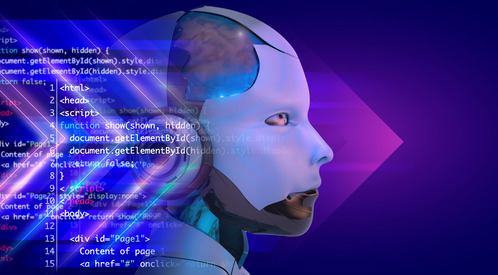How to get started with building career in AI
3AI June 20, 2018

Like AI itself, a career in AI requires one to commit to continuous learning. This field, like any other emerging field, is rapidly evolving with new models and applications coming to light almost every day.
The last few years have seen Artificial Intelligence capturing the imagination of corporate executives and catapulted into the mainstream of the business world. With a myriad, and ever-expanding set of applications, AI promises to provide a quantum leap in enterprise efficiency, profitability, and competitiveness. Due to decreasing costs of storage, increasingly efficient algorithms running atop chipsets more powerful than over before, AI is witnessing a huge surge in interest and applicability. As companies rush to co-opt AI into their processes, practitioners of this technology are in high demand – which easily outstrips high-quality supply. With a soaring growth in demand and supply struggling to catch up, it is natural for professionals of the current and future workforce to ask – how to get started with a career in AI?
It is important to put down some context. Before answering where one can get started, it is important to first define AI. A simple, yet comprehensive working definition for AI is – the ability of machines to mimic human intelligence and functions. Going one step downstream, building a truly artificially intelligent machine is to equip it with the ability to sense and comprehend ‘stimuli’ within its environment, identify and weigh response options for acting on the stimuli, performing the suggested action, and continuously learning from the impact of the action taken, in a way that informs future decision-making.
Parsing this definition further, AI happens at the intersection of data (represented as the stimulus provided and the feedback loops for learning), mathematics (represented through models which weigh up decision-points and payoffs for each prospective action) and computer science (the technical and logical backbone that governs the flow of data and codifies potential action points). These are the three key ingredients of building powerful AI – and the three areas aspirants to this industry need to master.
Let us double-click on these three areas to understand their criticality to AI systems, and how the workforce can build competencies in each area.
Data Literacy
While we can split hairs over the appropriate terminology (some prefer to call it Data Science, while others call it Data Engineering – depending on how teams are structured), it is important to focus more on the nature of the skill required in the AI arena.
Data skills encompass the entire range of tasks associated with data management for AI – the collection, sorting, storage, and extraction of data for meaningful use. It is data that fuels the growth of an AI application, and therefore the ability to sense incoming data, identify patterns therein and make informed decisions is a crucial building block for a career in AI.
Given the criticality of core data skills, it is not surprising to see data-literate employees – analytics professionals and data engineers – try their hand at reinventing their careers in this domain. Those who do not have a background in these two techniques should get started with courses in business analytics – to understand how businesses slice-and-dice data to inform their decision-making process. Those who have some background of computer science should upskill in data engineering areas i.e. how to effectively leverage emerging concepts in database management to improve storage, management, and extraction of data to feed AI applications in the most efficient manner. Alternatively, computer engineers could also learn business analytics to understand the applications and implications of data for business decisions.
Numeracy
Put simply, numeracy is the ability or skill to work with numbers and mathematical concepts. This is the second key ingredient for a successful career in AI. As I previously mentioned, a key building block of AI is to build the ability to weigh multiple options, probabilities, and payoffs across multiple options, to take the most optimal decision. These are essentially mathematical concepts of inference, probability, decision trees and game theory – and fine-tuning these skills are a critical part of building a great career in AI.
Developing advanced numeracy skills is a natural option for those who are mathematically inclined and have an education therein. Those who don’t have formal education in these areas can rely on numerous online courses that teach statistics and probability, before moving towards more advanced concepts. The takeaway from your education in numeracy should be the ability to formulate optimal pathways to decisions, identifying and accurately scoring multiple options, suggesting responses and continuously informing the mathematical model through a feedback loop, based on the results of responses delivered.
Computer Science
The final piece is to ramp up existing computer science skills to align with the needs of AI application development. There are two sub-areas at play here, namely – conceptualizing the logic (algorithms) and writing the language (code). Computer science provides the fundamental backbone required for improving the scalability and resilience of AI applications. It dictates how the data is operationalized and provides the logical base for mathematical models to process the data.
Python and R are two widely accepted languages in the field of AI. As a lot of existing developing in this domain has been done in these two languages, they provide rich libraries which are a key starting point to AI applications. Those who have a strong inclination and education in programming are highly advised to pick up online courses that provide hands-on skills in these two languages. Computer scientists well-versed with these two languages can also consider expanding their breadth into the numeracy skills – as these two works well in tandem and offer much better job opportunities in AI.
Like AI itself, a career in AI requires one to commit to continuous learning. This field, like any other emerging field, is rapidly evolving with new models and applications coming to light almost every day. While mastery of the above three skills is a good start, it is important to stay constantly updated to stay ahead of the curve. One way to do that is to keep an eye on research papers submitted therein. Additionally, it is equally important to keep an eye on the business end and staying updated on emerging use cases in this arena.
Disclaimer: The views expressed in the article above are those of the authors’ and do not necessarily represent or reflect the views of this publishing house






